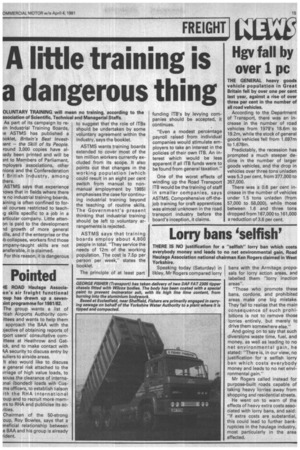A little training is a dangerous thin
Page 17

If you've noticed an error in this article please click here to report it so we can fix it.
OLUNTARY TRAINING will mean no training, according to the ssociation of Scientific, Technical and Managerial Staffs.
As part of its campaign to rein Industrial Training Boards, le ASTMS has published a ooklet, Britain's Best Investwrrt — the Skill of Its People, round 3,000 copies have al:ady been printed and will be 3nt to Members of Parliament, -nployers associations, other nions and the Conferederation f British Industry, among them
ASTMS says that experience lows that in fields where there -e no industrial training boards, aining is often confined to foral courses restricted to teachig skills specific to a job in a articular company. Little attenon is paid to the development id growth of more general (ills, and if the enterprise or the lb collapses, workers find those )mpany-taught skills are not ansferable, it is claimed.
For this reason, it is dangerous to suggest that the role of ITBs should be undertaken by some voluntary agreement within the industry, says the booklet.
ASTMS wants training boards extended to cover most of the ten million workers currently excluded from its scope. It also points out that changes in the working population (which could result in an eight per cent switch from manual to nonmanual employment by 1985) emphasises the case for continuing industrial training beyond the teaching of routine skills. The Government's present thinking that industrial training should be left to voluntary arrangements is rejected.
ASTMS says that training boards employ about 4,800 people in total. "They service the needs of 12m of the working population. The cost is 7.5p per person per week," states the booklet.
The principle of at least part funding ITB's by levying companies should be accepted, it continues.
"Even a modest percentage payroll raised from individual companies would stimulate employers to take an interest in the policies of their own ITB. An interest which would be less apparent if all ITS funds were to be found from general taxation."
One of the worst effects of winding up the Road Transport ITB would be the training of staff in smaller companies, says ASTMS. Comprehensive off-thejob training for craft apprentices was almost unknown in the road transport industry before the board's inception, it claims.












































































































